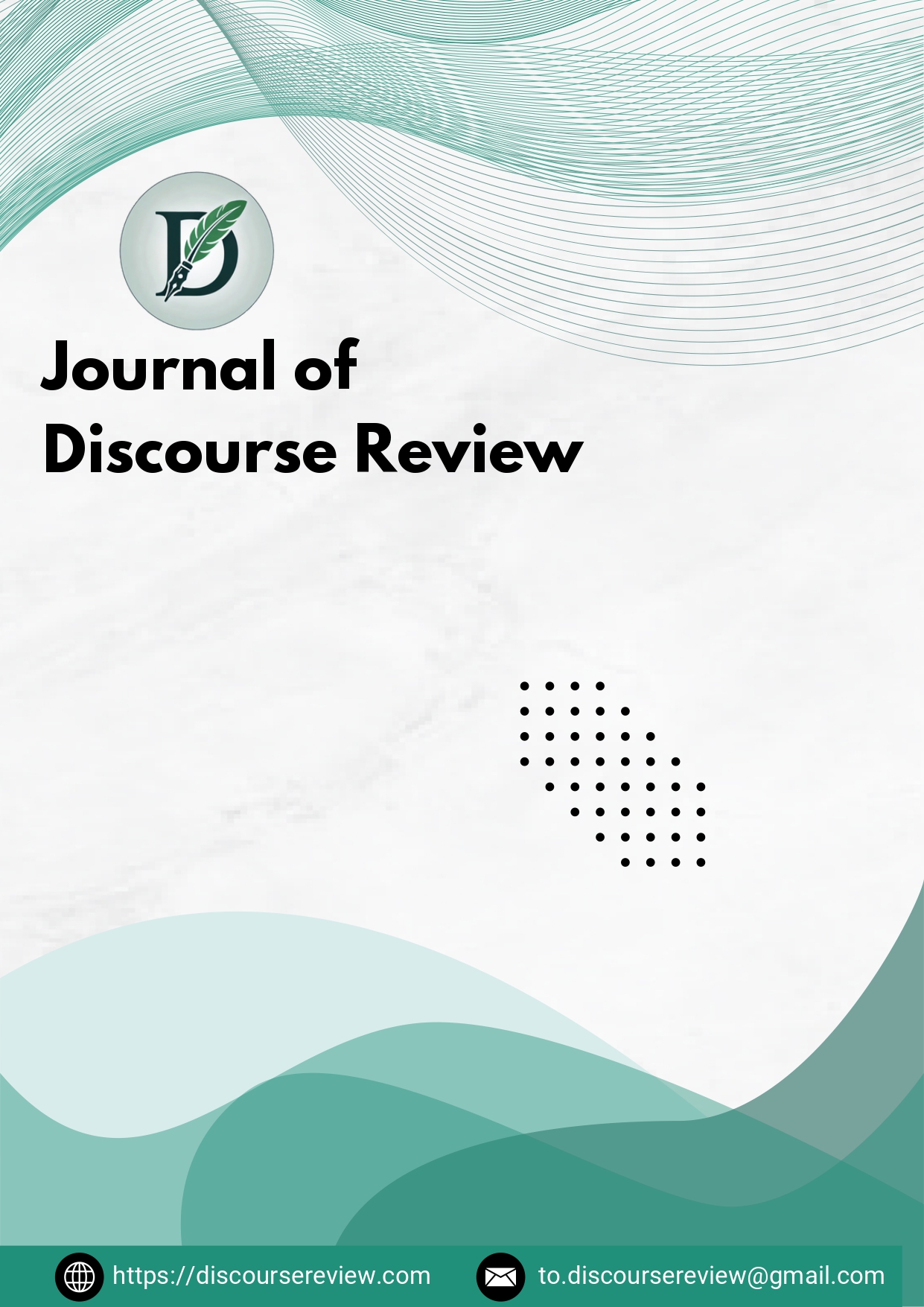
Journal of Discourse Review
Open Access Humanitarian Scholarship
7 days
Time to first decision

Open Access Humanitarian Scholarship
Time to first decision
Volume: 1 Issue: 1
Year: 2025, Page: 119-128,
Received: Feb. 25, 2025 Accepted: March 23, 2025 Published: April 22, 2025
The literary genre of coming-of-age has a long history and is primarily focused on the intricacies of identity formation, personal growth, and self-discovery. The current study explores, within this framework, the complex relationship between faith and identity in influencing life decisions as it is portrayed in Kazim Ali's poetry. Three key pieces—"Speech," "Autobiography," and "Home"—are highlighted in particular because they act as nucleuses for analysing the poet's exploration of existential desire, cultural estrangement, and spiritual reflectivity. The central research question enquires: In what ways do faith and identity shape the expression of individual and communal belonging in Kazim Ali's poetry? By using a qualitative research approach and careful textual analysis guided by the concepts of Critical Discourse Analysis (CDA), this study enables a thorough investigation of the linguistic, cultural, and ideological structures present in Ali's poetry. According to the study, Ali views identity construction as a dynamic and ever-changing process that is influenced by the conflicts between personal memory, diasporic experience, and religious conviction. His poetry emphasises the discord between inherited traditions and personal initiative, demonstrating how religion can both stabilise and complicate one's identity. The findings highlight Ali's skilful employment of religious symbolism, multilingual expression, and philosophical exploration to convey the scrappy yet resilient voice of the diasporic individual. Utilising these poetic techniques, Ali examines and redefines the parameters of belonging, proposing that identity is not a static essence but rather a dynamic negotiation of location, language, and belief. This study ultimately enhances discussions regarding the intersections of spirituality, identity politics, and literary expression within contemporary diasporic literature.
Keywords: Faith, Identity, Coming-of-Age, Belonging, Critical Discourse Analysis
Ali, K. (2005). The Far Mosque. Alice James Books.
Ali, K. (2007). Faith and silence. The American Poetry Review, 36(6), 7–11. JSTOR. http://www.jstor.org/stable/20683690
Ali, K. (2007). Poetry and space. The American Poetry Review, 36(4), 9–11. JSTOR. http://www.jstor.org/stable/20683568
Ali, K. (2008). The architecture of loneliness. The American Poetry Review, 37(6), 13–21. JSTOR. http://www.jstor.org/stable/20684033
Ali, K. (2008). The Fortieth Day. BOA Editions Ltd.
Ali, K. (2009). Bright Felon: Autobiography and Cities. Wesleyan University Press.
Ali, K. (2009). In the hurricane’s eye: On The butterfly’s burden. The Kenyon Review, 31(2), 187–195. JSTOR. http://www.jstor.org/stable/27653954
Ali, K. (2016). Sky Ward. Wesleyan University Press.
Anthias, F. (2006). Belongings in a globalising and unequal world: Rethinking translocations. In N. Yuval-
Davis, K. Kannabiran & U. Vieten (Eds.), The situated politics of belonging. SAGE.
Arnett, J. J. (2000). Emerging adulthood: A theory of development from the late teens through the twenties. American Psychologist, 55(5), 469–480.
Asad, T. (1993). Genealogies of religion: Discipline and reasons of power in Christianity and Islam. Johns Hopkins University Press.
Bakhtin, M. (1981). Discourse in the Novel (M. Holquist, & C. Emerson, Trans.). In M. Holquist (Ed.), The Dialogic Imagination (pp. 259-422). Austin: University of Texas Press.
Bhabha, H. (1994). The location of culture. Routledge.
Blommaert, J., & Bulcaen, C. (2000). Critical discourse analysis. Annual Review of Anthropology, 29(1), 447-466.
Derrida, J. (1978). Writing and difference (A. Bass, Trans.). University of Chicago Press. (Original work published 1967).
Durkheim, E. (1912). The elementary forms of religious life. Free Press.
Erikson, E. H. (1968). Identity: Youth and crisis. Norton.
Fairclough, N. (1989). Language and power. Longman.
Fairclough, N. (1992). Discourse and social change. Polity Press.
Fairclough, N. (1995). Critical discourse analysis: The critical study of language. Longman.
Foucault, M. (1972). The archaeology of knowledge and the discourse on language. Pantheon Books.
Frankl, V. E. (1959). Man’s search for meaning. Beacon Press.
Gareau, P., Bullivant, S. C., & Beyer, P. (2018). Youth, religion, and identity in a globalizing context: International perspectives (Youth in a Globalizing World, Vol. 8). Brill Academic Pub. https://doi.org/10.1163/9789004361874
Geertz, C. (1973). The interpretation of cultures. Basic Books.
Giddens, A. (1991). Modernity and self-identity: Self and society in the late modern age. Stanford University Press.
Hall, S. (1996). Who needs ‘identity’? In S. Hall & P. du Gay (Eds.), Questions of cultural identity (pp. 1–17). Sage.
Jones, R. (2020). Coming of age in contemporary literature and film. Routledge.
Lacan, J. (1977). The four fundamental concepts of psycho-analysis (J.-A. Miller, Ed.; A. Sheridan, Trans.). Hogarth Press.
Mahmood, S. (2005). Politics of piety: The Islamic revival and the feminist subject. Princeton University Press.
Marcia, J. E. (1980). Identity in adolescence. In J. Adelson (Ed.), Handbook of adolescent psychology (pp. 159–187). Wiley.
Modood, T. (2007). Multiculturalism: A civic idea. Polity Press.
Said, E. W. (2000). Reflections on exile and other essays. Harvard University Press.
Smith, C. (2003). Moral, believing animals: Human personhood and culture. Oxford University Press.
Smith, C., & Denton, M. L. (2005). Soul searching: The religious and spiritual lives of American teenagers. Oxford University Press.
Tajfel, H., & Turner, J. C. (1979). An integrative theory of intergroup conflict. In W. G. Austin & S. Worchel (Eds.), The social psychology of intergroup relations (pp. 33–47). Brooks/Cole.
Taylor, C. (1989). Sources of the self: The making of the modern identity. Harvard University Press.
Tillich, P. (1957). Dynamics of faith. Harper & Row.
Van Dijk, T. A. (1993). Principles of critical discourse analysis. Discourse & Society, 4(2), 249-283.
Vertovec, S. (2009). Transnationalism. Routledge.
Vetter, L. (2019). The violence of translingual identity in Kazim Ali’s Bright Felon: Autobiography and Cities and Julia Alvarez’s The Other Side / El otro lado. MELUS, 44(1), 110–131. https://doi.org/10.1093/melus/mly061
Yuval-Davis, N. (2011). The politics of belonging: Intersectional contestations. SAGE.
© 2025 JDR Academic Trust. This is an open-access publication distributed under the terms of the Creative Commons Attribution 4.0 International License (CC BY 4.0). https://creativecommons.org/licenses/by/4.0/
Hossain. M. N. & Islam, J. (2025). Negotiating Faith and Identity in Kazim Ali’s Select Poetry: A Coming-of-Age Perspective. Journal of Discourse Review, 1(1), 119-128.